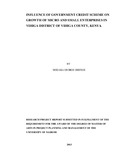| dc.description.abstract | MSEs are vehicles of achieving the Millennium Development Goals (MDGs) and Vision 2030
(Republic of Kenya, 2008). This study attempted to look at the influence of Government credit
scheme on the growth of MSEs in Vihiga District of Vihiga County in Kenya. The purpose of
the study was to assess the impact of government lending on the growth of MSEs and in solving
societal problems such as poverty, unemployment and the problems encountered by MSEs
including poor access to credit and low rating in terms of creditworthiness. The objectives of the
study were to examine whether the Government Credit Scheme had achieved its goals which
include: enhancing access to credit, reducing poverty levels, creating employment and
improving MSEs creditworthiness in the mainstream financial sector. Had the four aspects of
the GCS influenced the growth of MSEs in Vihiga District of Vihiga County? The study
adopted a descriptive survey design with both qualitative and quantitative approaches. In the
background of the study, the definition and economic contribution of MSEs worldwide is
covered. The study zeroed on MSEs in Africa and specifically Kenya. Poverty as a global
phenomenon was tackled. The contribution of MSEs to gross domestic product in Kenya and
employment creation was reviewed. The objectives of the study included; assessing how access
to credit, reduction of poverty levels, creation employment and improvement of creditworthiness
as aspects of Government Credit Scheme influence the growth of MSEs in Vihiga District. The
policy framework was analyzed in view of its moderating influence on the growth of MSEs in
Kenya. The MSEs were classified into strata with a representative random sample obtained from
various sectors comprising 203 MSEs out of the 448 enterprises that had been funded under the
GCS selected for the study, that is: retail trade, carpentry, bookshops, tailoring, bar and
restaurant, wholesale trade, posho mill, agribusiness, catering services, chemists, hardware and
salon. The data collection instruments that were employed were; structured interviews,
questionnaires and non-participant observation. To ensure internal validity of the instruments,
theoretical expectations were observed and care was taken in the selection of indicators to
measure the key concepts under study. To enhance external validity, all sectors of MSEs were
represented with random sampling being employed to select the sample. Test-retest co-efficient
was used to enhance the main questionnaire and ensure reliability during data collection.
Quantitative and qualitative analyses were applied to establish essential facts, accomplish the
objectives and to draw relevant conclusions. The study established that the GCS had made an
important contribution to the growth of MSEs in Vihiga District. The finance offered through
GCS had improved the standard of living of the households of the entrepreneurs that were
funded, improved the creditworthiness of MSEs and led to creation of employment
opportunities. The study also established that a majority of the businesses that had been loaned
through the GCS in Vihiga District had recorded growth in all the parameters that were used to
measure growth; growth in profit, creation of jobs, expansion in stock and opening of new branches, acquisition of new technology and purchase of new equipment. In view of the findings
outlined, the study recommends that the maximum loan amount be increased from Kshs.100,
000/= to Kshs. 500,000/=. The repayment period should also be increased from 24 months to 60
months. The government should look at the possibility of granting a grace period of one or two
months to the MSE operators before commencement of loan recovery. It is invaluable that BDS
be an integral and key plank of the government’s intervention policy. It is proposed that
“business extension” officers be engaged to offer BDS on an ongoing basis to improve the
transition rate to medium and large enterprises. The study concluded that the GCS is an
important tool that can be used to spur business growth in Vihiga District and should be upscaled
to cover more MSEs than is currently the case. | |

